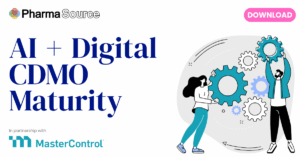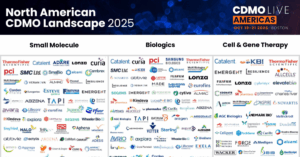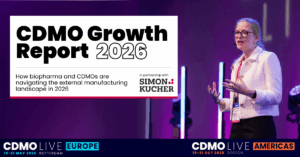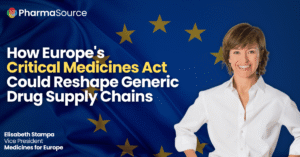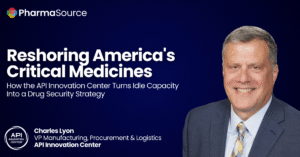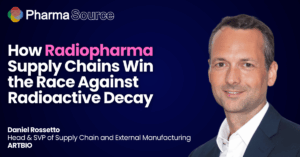“Trust is what your customers need most. They take a great risk when they sign up with you to make their product. They need access within your organization to feel confident you’ll get things done the way they want.” – Thomas Thorpe
Thomas Thorpe, CEO of Afton Scientific, brings 45 years of pharmaceutical operations experience to his founder-led Contract Development and Manufacturing Organisation (CDMO), which has grown from bootstrapped beginnings to a company with close to 100 employees specialising in sterile injectable manufacturing.
In the latest PharmaSource podcast episode, Tom explains how his experience working for large pharmaceutical companies shaped his approach to building a CDMO that prioritises customer relationships, regulatory compliance, and strategic growth investments—now culminating in a $200 million expansion plan in Albemarle County, Virginia.
Building a Culture of Compliance and Customer Service
What differentiates Afton Scientific in today’s competitive CDMO market is its unwavering focus on creating a positive environment both within the organisation and with customers. Tom’s approach stems directly from his experience at large pharmaceutical companies.
“When I brought people on—young people in their early twenties—we went from four to eight, then to 20, and now we’re almost 100 employees. What’s unique is that the same people who started with us 20 years ago are still leading the company.”
“The focus has always been a positive environment within the organisation while also building strong, lasting relationships with our customers,” explains Tom.
This philosophy translates directly to how Afton Scientific approaches regulatory compliance. According to Tom, their success hinges on understanding what matters most to pharmaceutical clients:
“To our customers, the most important thing is compliance, followed closely by competency and capacity. After that, it’s about meeting schedules and cost.”
Regulatory Excellence as a Competitive Advantage
Afton Scientific’s approach to quality management and regulatory compliance has been central to its success. The company has been inspected by multiple global regulatory authorities, including the FDA’s CBER and CDER divisions, the UK’s MHRA, and Japan’s PMDA.
What makes their quality management system particularly effective is the lack of barriers between departments:
“Afton doesn’t have the barriers that I saw at large pharma between the quality departments and the manufacturing departments. Every issue is everyone’s concern, and that makes everybody’s life much easier—especially from our customer’s perspective.”
Building Trust Through Customer Engagement
When asked about Afton Scientific’s approach to client partnerships, Tom emphasises that customers often come to them after negative experiences elsewhere.
”They’re often frustrated and dissatisfied with their previous CDMO. Some feel neglected or undervalued, dealing with unmet expectations. Maybe it’s missed schedules, unexpected price hikes, or quality issues from their previous provider.”
The Afton Scientific difference begins with immediate engagement: “We work with them, embrace them, and set up a dedicated project team. They get an immediate feeling that they’re dealing with the whole organisation, not just one isolated segment.
This high-touch approach explains why Tom compares his CDMO to a small private college rather than a large university:
“There are big universities and there are private colleges, and people make choices about where they go. We’re giving them much more attention. We’re offering them a relationship that they’re not going to find at a more impersonal organisation.”
“It shows with the loyalty of the customers who keep wanting us to adapt more and more of their products,” he adds.
Balancing Digital Solutions with Human Connection
While Afton Scientific has invested in digital solutions for project visibility, Tom believes that technology can’t replace regular human communication.
“We’re about three years into adopting electronic data and management systems. We’ve adapted SAP and metrics, which gives us insight to the performance of the departments. All that is helpful to our customers to understand yields better and how processing is going.”
However, Tom emphasises:
“What’s really important is the frequency of communication with your customers. We like to meet weekly with them on their projects. I don’t believe in a ‘fire and forget’ approach.”
“It’s the little things that come out—the scheduling anomalies, the raw material anomalies—all of those things are really important, and that cannot be handled electronically,” he explains.
Investing in Growth to Meet Customer Demand
After two decades of self-funded growth, Afton Scientific recently took on a financial partner to accelerate capacity expansion. This decision was driven by customer demand and the increasing cost of new manufacturing technologies.
“Customers are saying, ‘Can you scale? Can you offer prefilled syringes or cartridges? Can you do this? When you get this capability, we’re going to move our products over.”
Tom explains, “The technology investment is really accelerating, especially with isolator systems. What was once considered acceptable—RABS—has now been replaced by the more sophisticated isolator system.”
This has led to significant expansion plans:
“We’re adding a prefilled syringe, an isolator line right now in one of our existing buildings. We’re relocating and expanding, increasing its size by four or five-fold. We’ve acquired six and a half acres adjacent to us—and we’re in the process of constructing a new facility that’s over 400,000 square feet. It’ll be an investment of well over $200 million.”
Addressing Cost Pressures in Sterile Manufacturing
When discussing cost management, Tom provides a fascinating insight into the structure of costs in sterile injectable manufacturing.
“The cost profile in manufacturing sterile injectable drug products shows variable cost is a very small amount—your components, vials, stoppers, seals, even direct labour is not a very high cost to your finished product. What’s costly is your API, which the customer usually provides, and overhead.”
Most surprising is the proportion of quality staff:
“Employees in the quality department amount to 32 percent of the staffing at Afton Scientific. It’s a breathtaking percentage for any industry. One in three people has a ‘Q’ in front of their title here.”
Rather than seeing this as a burden, Tom views it as essential: “It pays off in compliance. It pays off in reduced problems on the manufacturing floor. All that, in the long run, improves the profitability and minimises the costs for your customer.”
The Future: Continuous Investment or Obsolescence
Looking to the future, Tom shares a cautionary tale that has shaped his growth philosophy. Early in his career, he worked at a small pharmaceutical company that had been founded in the 1800s—the same year as Bristol Myers.
“As the regulatory and technology advanced, this firm grew until the early 1900s. Then, as the regulations and technologies evolved, they failed to invest and continuously shrunk. That left a lasting impression on me—if you don’t reinvest in your company, people, assets and technologies, you risk falling behind in this industry.”
Tom explains that without continual investment, “customers expect us to stay at the forefront of technology and regulatory standards. They really want you ahead of the curve because they can’t afford any problems.”
This philosophy drives Afton Scientific’s ambitious growth plans:
“Our 3- to 5-year plan includes a $25 million investment in a new isolator line for syringes, vials, and cartridges. We’re also adding a 5,000 square foot QC lab expansion and a 400,000 square foot building that will put us to nearly half a million square feet – and upwards of eight new production lines.”
The company expects to have this new facility operational within two and a half years, positioning Afton Scientific for its next phase of growth in the sterile injectable CDMO market.
Meet the Afton Scientific team at CDMO Live 2025. Download the agenda here





